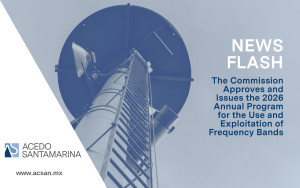The review of the United States-Mexico-Canada Agreement (USMCA), originally scheduled for July 2026, is expected to be brought forward and commence in the second half of this year. This process represents a strategic opportunity for Mexico, although it´s also anticipated to be a complex renegotiation that may involve substantial modifications to various provisions of the agreement.
The acceleration of the review process is partly due to pressure from the United States, particularly under President Donald Trump’s administration, which has employed the threat of imposing tariffs as a negotiation tool. Trump has questioned the benefits of the agreement for the United States and has suggested the need to “adjust or even terminate” it. Among his main objectives are the tightening of rules of origin, especially in the automotive sector, and preventing foreign, particularly Chinese, companies from using Mexico as a platform to access the U.S. market.
From Mexico’s perspective, this early review is seen as an opportunity to reduce the uncertainty that has led to a decline in investment in the country. Beyond the terms of the renegotiation, there are structural domestic issues that limit Mexico’s ability to take advantage of the agreement’s benefits. It is essential to strengthen the rule of law and invest significantly in strategic infrastructure, particularly in electricity generation, water supply, and logistic access via land, sea, and rail. The absence of these conditions has created an environment of uncertainty that has negatively impacted foreign direct investment. Not only has there been a decline in new projects, but several companies that had previously expressed intent to establish operations in Mexico have chosen to withdraw due to recent regulatory changes, particularly in the judiciary, and a lack of clear legal guarantees.
The initial expectation that the USMCA would trigger a new wave of capital inflows and supply chain relocation has been undermined by these internal challenges. Consequently, although the anticipated review may serve as a tool to reduce uncertainty and foster a more investment-friendly environment, the reality is that without a robust institutional framework and adequate infrastructure, Mexico will be unable to fully capitalize on the current global shift toward regionalized trade models.
Furthermore, this review will face significant obstacles due to Mexico’s non-compliance with several provisions of the current agreement. Key concerns include the weakening or dismantling of autonomous regulatory bodies in strategic sectors, such as telecommunications and mining, the erosion of judicial independence, and the unilateral revocation of previously signed agreements with foreign companies regarding offshore oil and gas exploration and production. These issues will come under scrutiny during the negotiations, in which Mexico may face pressure both from new U.S. interests and from existing claims of treaty violations.
Despite the prevailing protectionist climate and the challenges this review entails, Mexico remains a highly competitive economy. However, experts agree that such competitiveness can only be translated into sustained investment attraction if a predictable legal environment is ensured and domestic incentives are strengthened.
One of Mexico’s objectives for this review is the inclusion of a specific chapter on the semiconductor industry to attract high-tech investment. This initiative aligns with the Semiconductor Master Plan 2024–2030, which has already achieved over half of its interim goals.
Key topics to be discussed during the renegotiation include the rules of origin in the automotive sector and the need to ensure that manufacturing within the North American bloc has genuine regional content. Existing and potential tariffs, as well as bilateral trade imbalances, will also be on the table.
In light of this scenario, Mexico must adopt a firm and strategic stance aimed at safeguarding the principles of free trade and securing unrestricted access for its products to the U.S. market. Although Mexico retains the right to impose countermeasures under the USMCA and the WTO, it has chosen not to apply immediate retaliation in order to preserve a bilateral relationship that is vital for both economies.
In parallel with this trade agenda, there is a clear need to rethink Mexico’s economic development model from an internal standpoint. The economic growth recorded in 2024, the weakest in three years, demonstrates that external openness alone is insufficient to ensure sustained development. In this context, it is urgent to increase public investment, which in turn requires a structural fiscal reform that, although postponed for decades, is becoming increasingly unavoidable.
It is also imperative to diversify Mexico’s international partnerships. There has been growing engagement with actors such as the Community of Latin American and Caribbean States (CELAC) and China, as well as a recognition of the need to strengthen ties with Latin America, Southeast Asia, and India, while learning from Europe’s experience in regional integration.
It is worth noting that despite President Trump’s remarks about a potential termination of the agreement, the USMCA has a formal duration of 16 years from June 2020, meaning that early termination would not be legally viable before 2036. The review scheduled for 2026 is intended to determine whether the agreement will be extended for another 16-year term; otherwise, it will be subject to annual reviews until its expiration. According to experts, a formal withdrawal from the agreement in the short term is unlikely. The most probable scenario is a tough, protracted renegotiation involving possible adjustments but within the framework of continued regional trade cooperation.
In conclusion, the anticipated review of the USMCA marks a turning point for Mexico’s economic future between 2025 and 2030. However, its potential impact will depend not only on the outcomes of the negotiation table but also on the country’s institutional strengthening and its ability to provide legal certainty and adequate infrastructure. Without these elements, the benefits promised by the agreement will continue to erode, and Mexico will miss one of the most significant geoeconomic opportunities of recent decades.
Daniela Zermeño
References
- BBVA. (2025, April). BBVA México confía que revisión adelantada del T-MEC reducirá incertidumbre en inversión; asegura que podrían modificarse cláusulas del tratado. [Press release]. https://www.bbva.mx
- El Financiero. (2025, April). México será competitivo pese a revisión del T-MEC. https://www.elfinanciero.com.mx
- El Financiero. (2025, April). Trump adelanta que renegociación del T-MEC viene en 2026, ‘para ajustarlo o terminarlo’. https://www.elfinanciero.com.mx
- El Financiero. (2025, May). Trump mete ‘turbo’ a revisión del T-MEC: ¿Puede EU abandonar el acuerdo comercial con México? https://www.elfinanciero.com.mx
- El País. (2025, April). Ebrard confirma que la revisión del TMEC se adelantará al segundo semestre de este año. https://elpais.com/mexico
- El País. (2025, April). Sheinbaum y Carney hablan sobre la relación México-Canadá y “la importancia” del T-MEC. https://elpais.com/mexico
- Forbes México. (2025, April). Revisión adelantada del TMEC puede llevar a una renegociación más profunda: grupo financiero. https://www.forbes.com.mx
- Grupo Milenio. (2025, April). México debe ser cuidadoso en la revisión del T-MEC, señala experto. https://www.milenio.com
- La Jornada. (2025, April). La revisión del T-MEC se adelantará a este año, prevé Ebrard. https://www.jornada.com.mx




